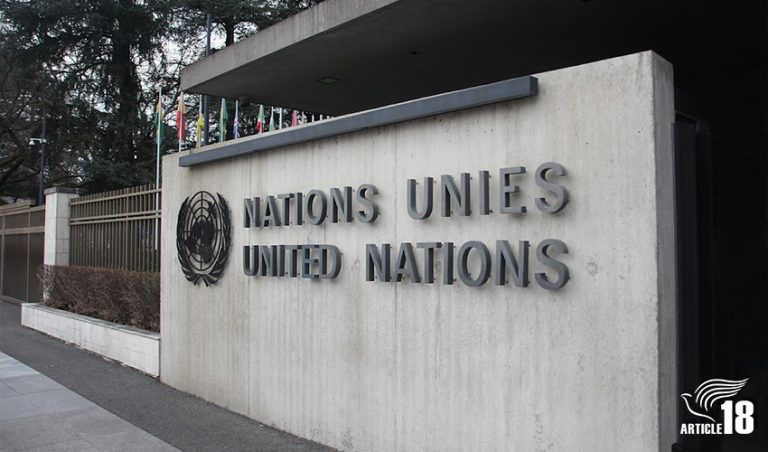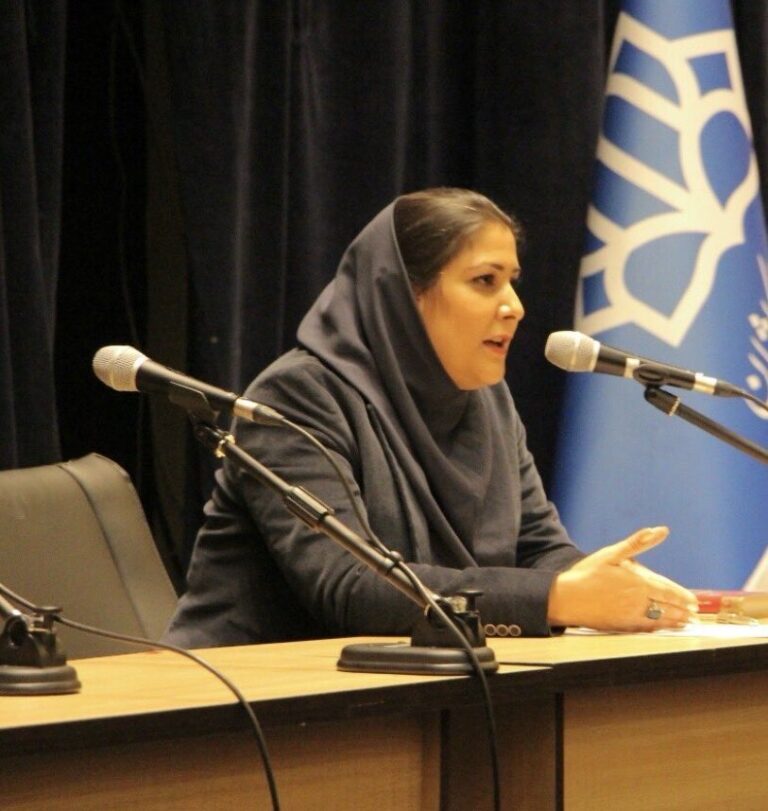
Article18 has submitted a joint report to the UN Human Rights Council ahead of Iran’s upcoming Universal Periodic Review, highlighting the ongoing rights violations experienced by Christians.
In the submission, written in collaboration with partner organisations Open Doors, CSW and Middle East Concern, we outline the primary violations and provide recommendations for UN member states to ensure Iran is held to account.
Below is a summary of our submission, which can be read in full here.
Which violations are highlighted?
The primary violation listed is Iran’s failure to recognise the majority of its Christians – converts from nominally Muslim backgrounds – and as a result denying them the rights afforded to the recognised Christians of Armenian and Assyrian descent.
We reference Iran’s 2020 response to five UN Special Rapporteurs, in which it claimed “nobody is prosecuted on religious grounds” and “regarding [house-churches] legal action will be taken in case of illegal activity for anti-security purposes of Zionist Christian cult”.
“In reality, house-church meetings are religious gatherings,” we explain. “They are not political vehicles and are in no way associated with Zionism, subversive, or a threat to security.
“Christian converts gather in homes because they are precluded by the State from attending public churches. In the words of a lawyer who represented three Christian converts who were each sentenced to five years’ imprisonment in 2022, their only ‘crime’ is ‘meeting to pray and worship as Christians’”.
We note that even recognised Christians face discrimination and are prohibited from possessing any material in the national language (Persian) unless authorised by the State, including Bibles. And they too face imprisonment if they are deemed to have promoted Christianity among people from a Muslim background or to have invited them to attend church services.
Rash of sentences
We highlight the recent rash of sentences, with eight Christian converts from the city of Izeh condemned in May to a combined total of nearly 45 years in prison.
We also highlight the cases of three Christians currently serving 10-year prison sentences: convert Yasser Akbari, Iranian-Armenian pastor Anooshavan Avedian, and Armenian national Hakop Gochumyan.
At least 16 Christians are currently serving prison sentences on account of their faith, we explain, while over 160 Christians were arrested last year, an increase from 134 in 2022 and 59 in 2021.
ICCPR violations
We provide examples of the articles of the International Covenant on Civil and Political Rights – which Iran has ratified – that are violated in the case of Christians:
- Article 7 – Prohibiting torture.
- Article 9.1 – Prohibiting arbitrary arrest and detention.
- Article 9.2 – Mandating that detainees are told swiftly the reason for their arrest.
- Article 10.1 – Treating detainees with humanity and dignity.
- Article 14.1&2 – Fair-trial provisions and presumption of innocence.
- Article 14.3 – Mandating that detainees be defended by a lawyer of their choosing.
- Article 17.1 – Prohibiting arbitrary or unlawful interference with privacy.
- Article 18.1 – Re. freedom of religion or belief (FoRB).
- Article 18.2 – Prohibition of coercion regarding one’s beliefs.
- Article 18.3 – Only placing justifiable limitations on the manifestation of religious belief.
- Article 18.4 – Right to pass on one’s beliefs to one’s children.
- Article 19.1 – Right to hold opinions.
- Article 19.2 – Freedom of expression.
- Article 21 – Right of peaceful assembly.
- Article 26 – Equality before the law.
Post-prison pressures
We also note that pressures on Christians and their families continue even after they are released from arrest or imprisonment, including through:
- monitoring and harassment;
- denial of employment;
- denial of education and qualifications;
- new charges or reopening cases;
- enforced Islamic re-education classes, during which converts are pressured to return to Islam;
- additional post-prison penalties, such as internal exile, flogging, fines, travel bans, and deprivation of social rights, including membership of any group;
- the imposition of community-service orders, for example grave-digging or washing dead bodies before burial;
- and coercion through threats to leave Iran.
Recommendations
We conclude by calling on member states to urge Iran to:
- Respect and protect the rights enshrined in the ICCPR, including the right to FoRB for everyone, including religious converts, and regardless of their ethnic or linguistic group;
- Amend Article 13 of the constitution to conform with the provisions of the ICCPR, including under Article 18 ICCPR;
- Release immediately and unconditionally Christians detained under investigations, criminal charges or prison sentences related to peaceful religious activities;
- Drop all charges against Christians related to church activities deemed lawful by Iran’s Supreme Court;
- Cease the criminalisation of house-church organisation and membership, allowing Christians of all ethnic backgrounds to worship freely and collectively;
- Return places of worship and other properties and material confiscated from Christians in connection with peaceful faith practices;
- Permit the reopening of churches closed during the Covid-19 pandemic, and those forcibly closed for allowing the attendance of converts and holding services in the Persian language;
- Clarify where Persian-speaking Christians may worship in their mother tongue, without experiencing arrest, prosecution and imprisonment;
- Ensure the cessation of the use of provisions such as those under Articles 498, 499, 500 and 513 of the Islamic Penal Code and Article 167 of Iran’s constitution to unjustly prosecute and convict Christians;
- Guarantee access to legal counsel for all individuals charged with “national security”- related crimes, as well as and the right to select a lawyer of their choice, and repeal the Note to Article 48 of Iran’s Criminal Procedures Regulations;
- Cease discrimination against minority-faith adherents in public life, including by repealing or amending discriminatory provisions in the Civil Code, such as those concerning marriage (Article 1059) and inheritance (Article 881 bis). Further, grant them equal employment opportunities, including eligibility for high public positions;
- Grant unhindered access to the country to the UN Special Rapporteur on the situation of human rights in the Islamic Republic of Iran, allowing the Special Rapporteur unhindered access to assess compliance with international human rights law.
Read the full submission here.



0 Comments
Trackbacks/Pingbacks